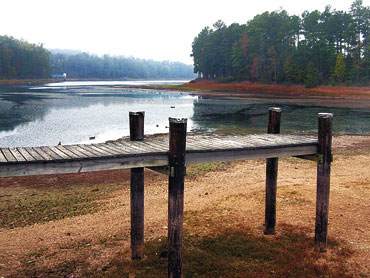Search the ArchivesNavigationContact InformationThe Citizen Newspapers For Advertising Information Email us your news! For technical difficulties |
Unlike Atlanta, Fayette has 200-day water supplyTue, 10/16/2007 - 4:48pm
By: John Munford
Outdoor watering ban drops local daily demand by 27% Georgia’s total ban on outdoor watering has reduced water usage significantly for the water systems operated by the city of Fayetteville and by Fayette County, officials said. The complete ban on outdoor watering has saved the city about 450,000-550,000 gallons a day, reducing usage to between 1.4-1.5 million gallons a day,according to Fayetteville Public Works Director Rick Eastin.  What once were fishing docks stand high and dry at Lake Kedron, one of Fayette County's major water reservoirs. The lake in northern Peachtree City feeds downstream Lake Peachtree. The county water system supplies water to most of Peachtree City, Tyrone and the unincorporated county, and part of Fayetteville's supply. Photo/Emily Baldwin.
What once were fishing docks stand high and dry at Lake Kedron, one of Fayette County's major water reservoirs. The lake in northern Peachtree City feeds downstream Lake Peachtree. The county water system supplies water to most of Peachtree City, Tyrone and the unincorporated county, and part of Fayetteville's supply. Photo/Emily Baldwin.
“We have seen the demand just drop off completely,” Eastin said. In Fayette County, demand has dropped about 27 percent since the ban went into effect, said Water System Director Tony Parrott. Parrott said the streams that feed Fayette’s water system are as low as they’ve been in a long time, and experts are predicting that rain will be hard to come by in the near future. Still, as of Tuesday the water system had enough water on hand to last 200 days, even if Flat Creek and the Flint River streams immediately dried up. Fayette County is permitted to withdraw up to 22.5 million gallons a day, but on Oct. 1, immediately after the ban, the system withdrew 11.4 million gallons. Four days after that, the figure was down to 7.6 million gallons. Fayetteville has two main goals it has to meet every day, Eastin said. One is to provide potable water for drinking and bathing. The other is to have enough water on hand in case of a house fire or similar incident. When the ban first went into effect, the city of Fayetteville got between 10-15 calls a day reporting water ban violations, but the number has trickled way down over the past few days, Eastin said. Each of those addresses, whether a home or a business, got a personal visit from a water employee, who would speak with someone if they were home or at least leave a warning notice of the water ban, Eastin said. The offending addresses received a warning and also went on a list to track possible repeat offenses. So far there have been none, Eastin said. Many of the offenders said they simply weren’t aware of the total outdoor watering ban, or they misunderstood the ban, thinking it was just for the area around the north Georgia mountains, Eastin said. “Everyone has been very cooperative,” in adhering to the ban, Eastin said. Customers have been doing likewise for Fayette County, Parrott said. On the first report of a violation a warning is given. After that the county’s marshal’s office gives a citation, Parrott said. Those citations are disposed of in Fayette County State Court. Much of Fayetteville’s water savings has come from the shutdown of lawn irrigation systems such as those used by retail establishments and at the entrance of subdivisions, Eastin said. At this time of year, water doesn’t help summer grasses much, and it’s best to let the grass go dormant for the winter, Eastin said. The city has a process to deal with repeat watering ban offenders. Any addresses that appear on the list a second time are subject to being issued a citation to appear in city court. The citation would be handed out by the city’s code enforcement department, Eastin said. The city gets about 650,000 gallons a day from two production wells and buys the remainder of its water needs from the Fayette County Water System, Eastin said. Prior to the total outdoor watering ban, the city bought roughly 1.2 to 1.3 million gallons a day from Fayette County, Eastin added. The city also gets water from Whitewater Creek, but has been unable to do so since May because of low levels in the creek, Eastin said. Here are the water ban rules: It has been almost three weeks since state officials ordered 61 Georgia counties, including Fayette, to halt all outdoor watering due to the drought. The ban puts an end to watering grass and landscaping, car washing, decorative water fountains and even kids playing in the sprinklers. Even sports fields can’t be watered under the ban, putting a significant cramp on the fields’ health for football season, officials have reported. According to the EPD, the following activities are explicitly exempted from the statewide ban on outdoor water use: • Use of gray water or cooling system condensate (in compliance with local codes) • Use of “reclaimed water” for landscape purposes • Irrigation of food gardens • Irrigation of greens on golf courses • Landscapes newly installed by certified or licensed professionals (only for 30 days) Other commercial exemptions include: • Irrigation contractors • Sod producers • Growers (ornamentals, fruits and vegetables) • Retail garden centers • Power washers • Construction sites • Car washes • Other activities essential for daily business (this exemption refers to activities that are primary operation of your business. For example, a window washing business would be included in this category, but a delivery company who washes their own trucks would not.) login to post comments
|